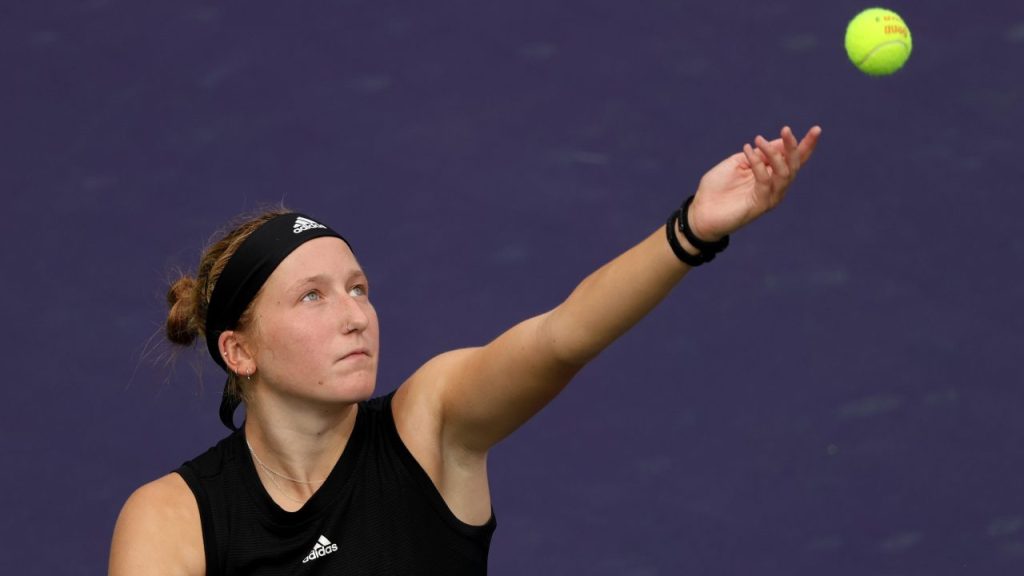Within hours of U.S. District Judge Claudia Wilken giving preliminary approval to a multibillion-dollar settlement in the House, Carter and Hubbard antitrust lawsuit, U.S. District Judge Katherine Eagles announced that the University of North Carolina tennis player , the NCAA scored another victory Monday when it denied Reese Brandtmeyer’s preliminary motion. Injunction. Brantmeyer asked the Eagles to prohibit the NCAA from enforcing prize money rules on college athletes participating in individual sports while an antitrust lawsuit against the organization is pending.
Brandtmeyer sued the NCAA in March and hopes to have the case certified as a class action lawsuit on behalf of herself and other athletes in Division I individual sports. These sports include tennis, golf, swimming, track and field, wrestling, gymnastics, skiing, fencing, women’s bowling, indoor and outdoor cross country, women’s triathlon, women’s equestrian, rifle, and skiing.
Brantmeyer alleges that the NCAA and its member schools are engaged in a price-fixing conspiracy that artificially deflates individual athletes’ income opportunities. Brantmeyer also claims the NCAA used amateurism rules to stage a mass boycott of athletes who received prize money.
The NCAA prohibits tennis players from receiving more than $10,000 in prize money per year prior to college, and additional prize money is allowed as long as it does not exceed actual necessary expenses. Brantmeyer argues that the ban amounts to price manipulation. Presumably, college athletes will be able to earn unlimited income through NIL transactions and, if the aforementioned antitrust settlement is finalized, the ability for colleges to pay athletes salaries subject to annual salary cap-style limitations. It would be difficult to justify this restriction given that Media Rights, Ticket Sales Sponsorship, NIL.
But as the Eagles explained, a preliminary injunction is an “exceptional relief.” Determining that Brantmeyer’s claims were insufficient, the judge offered several reasons.
First, Eagles writes that the “evidence of competition harm from prize provisions,” a central claim in the antitrust debate, is “remarkably thin.” The Eagles believe Brantmeier has a thorough understanding of how many college athletes play in each sport, how much money-winning opportunities exist in each sport, and how likely it is for athletes in each sport to win money. He explained that he had not presented any evidence.
The Eagles were also unconvinced by Brandtmeier’s argument that prize money limits would reduce the number of college players competing in prize tournaments. The judge reasoned that the relevant market in Brantmeyer’s case involved college athletics, not non-NCAA events. The Eagles further added that even if some players miss out on the chance to compete in the NCAA due to prize money restrictions, Brantmeier said, “The number of players making this decision is meaningful enough to at least have a real impact on quality.” “There is no indication that there is,” he said. In all individual sports. ”
The Eagles said another flaw in Brandtmeyer’s injunction request is that while “a few elite athletes” in tennis, bowling, and perhaps swimming may be able to win “significant prize money,” “a person may The same goes for golf.” The judge concluded that this effect on the market in general was “insufficient to demonstrate a likelihood of success on merit.”
However, the NCAA has not completely convinced the judges that it is on the right side of the law.
Citing the U.S. Court of Appeals for the Ninth Circuit’s decision in Ed O’Bannon v. NCAA, where the court found it was “not reliable” that the NCAA’s eligibility rules “do not regulate any commercial activity.” , the Eagles dismissed the NCAA’s claims regarding prize money. The Money Rule is a “non-profit eligibility requirement” and is therefore outside the scope of antitrust law. The justices also agreed with Brantmeier that the NCAA lacks a competitive edge in managing the market for the services of individual athletes who play DI sports and wish to “exchange their athletic pursuits for a college education.” .
Brantmayer may appeal the ruling to the Fourth Circuit Court of Appeals, but he has not lost the case. Even if you are unable to obtain a preliminary injunction, you may ultimately prevail in a jury trial over the same set of issues.
But for now, register another legal victory for the NCAA.



